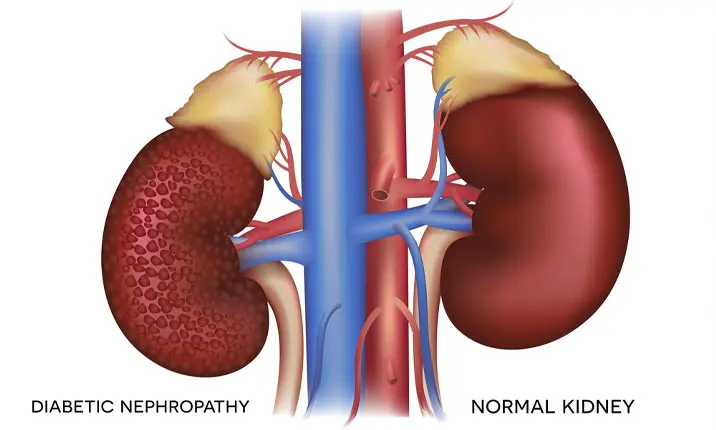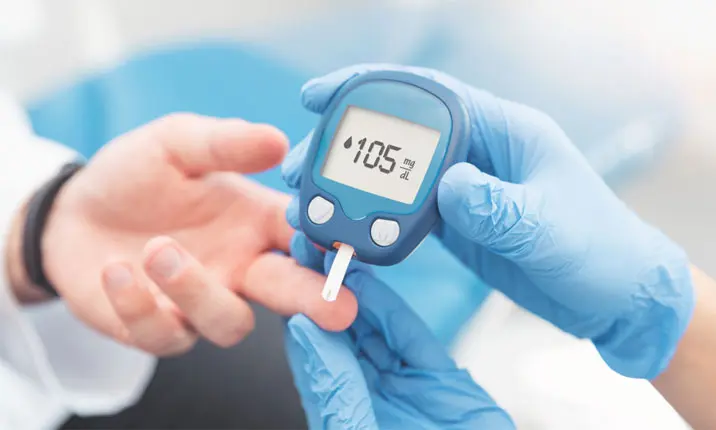What does diabetes do to the kidneys?
1: The nature of diabetes is that it causes damage to small blood vessels in the body. Blood vessels are important as they transport nutrients and oxygen for our organs, tissues and cells to live. So when these blood vessels get injured, they can't perform this function well, which over time, causes damage to our organs.
The main function of our kidneys is that it cleans our blood by filtering unwanted by-products and excess water for excretion through the urine. When the blood vessels in the kidneys are damaged due to long-term, uncontrolled or undiagnosed diabetes, it can cause the retention of water, salt and other waste products inside the body.
As diabetes also damages the nerves, people with diabetes may have difficulty emptying their bladder. This could eventually lead to conditions such as urinary tract infections and eventually, kidney damage.
What is diabetic kidney disease?
2: Diabetic kidney disease (DKD), also known as diabetic nephropathy, describes the kidney damage caused by diabetes.
DKD is progressive, being minimal in the initial stages and becoming more severe over the years. The condition is usually classified based on how well the kidney is functioning (determined by blood tests). There are 5 stages, with Stage 1 indicating normal to minimal kidney damage and Stage 5 indicating kidney failure.
For patients with end-stage kidney disease or kidney failure, renal replacement therapies such as a kidney transplant or dialysis would be lifesaving. Both attempt to replace the function of the damaged kidneys to varying extents.
I am diabetic. Are my kidneys in danger?
3: Yes. Patients with diabetes do have a risk of developing kidney disease. However, some patients are at higher risk compared to others.
Factors that increase risk of diabetes kidney disease include:
- high blood pressure
- poorly controlled blood sugar
- longer duration of diabetes
- overweight (high body mass index)
- poor diet
- presence of other complications of diabetes (eg. diabetic nerve disease, diabetic eye disease)
4: In a recent Singaporean study of 1,861 patients with diabetes, 53% had some form of DKD. However, 42% had stage 1 DKD. The proportion of patients with more severe disease reduced with advancing stages of kidney disease. In 2010, 1 in 9 Singaporean adults and 2 in 3 new renal failure cases have diabetes. Diabetes poses a real risk of kidney disease if it isn't properly taken care of.
But, how will I know if diabetes is affecting my kidneys?
5: The concern with DKD is that there may be little signs during the initial stages. However, it can be detected by a simple urine test that can help determine the presence of proteins. The test is very important as, the presence of proteins in urine is the first indication that your kidneys are not functioning correctly.
Blood tests to check kidney function also help doctors monitor and determine if your kidneys are affected by diabetes, and by how much. This is why it is important to ensure you go for the scheduled blood tests as prescribed by your doctor.
6: Signs and symptoms of DKD depend on how badly the kidneys are affected. They include:
- protein in the urine
- high blood pressure
- ankle and leg swelling
- urinating more frequently at night
- abnormal kidney function tests
- nausea and vomiting
- weakness
- anaemia
- itching
Can diabetic kidney disease be prevented?
7: The key to preventing DKD is to maintain good blood sugar control by:
- ensuring a healthy lifestyle (diet and exercise)
- taking your diabetic medicines properly
Keeping to your doctor's appointments for blood tests and check-ups will also help in ensuring that other risk factors are taken care of.
Can diabetic kidney disease be cured?
8: Though DKD cannot be reversed, its progress can be controlled by:
- following all steps in preventing DKD above; and
- observing a low-protein diet so your kidneys don't need to work as hard
Additionally, there are certain medications used for diabetes and high blood pressure that have shown to protect the kidneys.
Always remember, regardless of the stage of DKD, there are measures available to improve outcomes.
If my kidneys fail, is there still hope?
9: Yes, there is! In individuals whose kidneys have completely failed, a procedure called dialysis is available. It basically helps to replace the kidneys' function by filtering out excess water and toxins from your body.
There is also the option of undergoing a kidney transplant. This is a surgical procedure that replaces the damaged kidneys with a healthy kidney from a donor. Only one kidney is required to replace the function of both kidneys. The advantages of kidney transplant include a better quality of life, fewer dietary restrictions and cumulatively, a lower cost compared to long-term dialysis. Learn more about kidney transplants and answers to commonly asked questions.
What else can you do?
- live a healthy lifestyle with proper diet and exercise
- talk to your doctor regarding monitoring your blood sugars at home
- take the medicines prescribed to you properly
- keep your doctor's appointments so that they can monitor your condition and advise you accordingly
- be aware that certain over-the-counter/traditional medicines could adversely affect your kidneys, so always check with your physician first.
Consult a renal medicine doctor for an accurate diagnosis of your condition, the available treatment options and how you can best take care of your kidneys.















